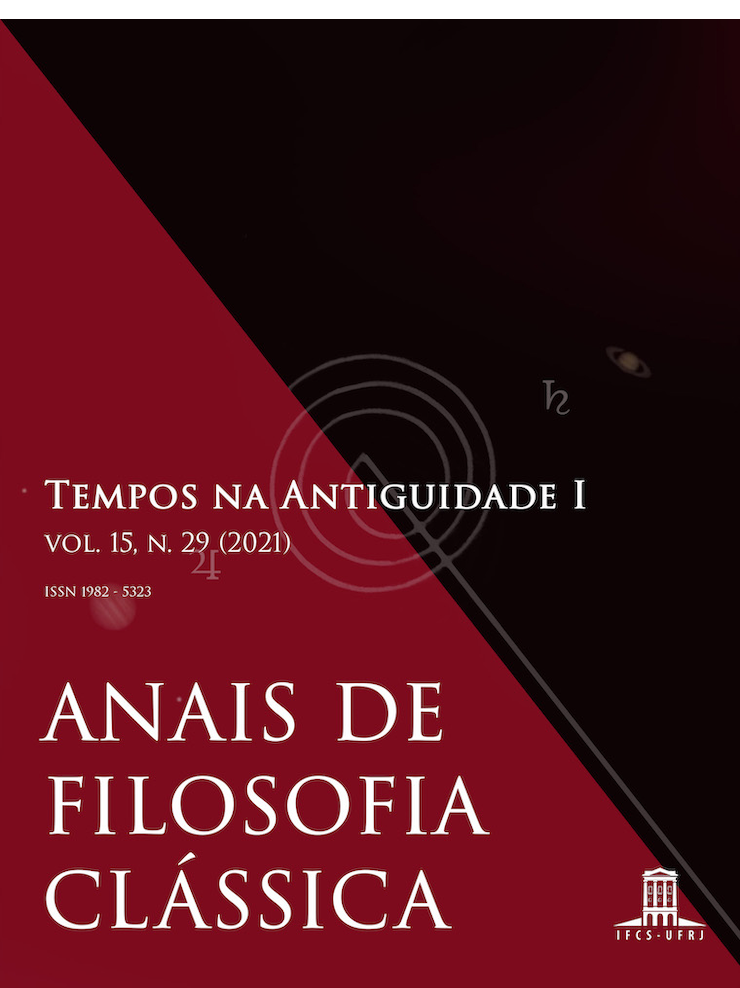O método de “divisão” e a temporalidade no conhecimento das Ideias platônicas
DOI:
https://doi.org/10.47661/afcl.v15i29.45857Palabras clave:
Platão, Divisão, Tempo, Reminiscência, IdeiasResumen
A certa altura do Político de Platão, vemos o Estrangeiro estabelecer, no emprego do método de divisão, que não basta efetuar “divisões”, mas que é fundamental as partes divididas corresponderem a Ideias realmente existentes (262b-263a). A resposta do “jovem Sócrates”, seu interlocutor, é a desconcertante pergunta: “mas, com relação a isso, como saber que o gênero e a parte (desse modo tornada mais visível), não são idênticos mas diferentes entre si?” (263a). O desconcerto da questão é tal que o menino fica sem resposta. O motivo parece ser que ela aponta para o caráter “circular” do método de divisão, em vista do qual, desde a Antiguidade, este sofre uma acusação de petição de princípio. A “circularidade” no tempo seria que, se o que importa é, como resultado das divisões, que as Ideias se tornem “visíveis” a alguém (Político 262b), por outro lado, só pode efetuar a divisão certa aquela pessoa que, de um certo modo, já está “enxergando” a própria estrutura de Ideias (Sofista 253b-e). Nas palavras de Aristóteles, a divisão “é um tipo de silogismo fraco”, porque alcança ou quer provar aquilo de que ela já parte como pressuposto (An. Ant. 46a33). Contudo, a análise de passagens platônicas sobre a “reminiscência” e a relação das Ideias com o tempo pode indicar que Platão teria resposta para seu eminente discípulo. Afinal, não jaz, nas entrelinhas do famoso “paradoxo do Mênon” (“como procurar algo que não se sabe absolutamente o que é?”), a questão: é a Ideia “temporal”?
Descargas
Citas
ACKRILL, J. L. In defense of Platonic Division. In: ____________ Essays on Plato and Aristote. Oxford: OUP, 2007 (1997).
AMBUEL, D. Pigs in Plato: Delineating the Human Condition in the Statesman. In: HAVLICEK, A.; JIRSA, J.; THEIN, K. (ed.). Plato’s Statesman. Proceedings of the Eighth Symposium Platonicum Pragense. Prague: Oikoymenh, 2013.
BLUCK, R. S. Plato's Sophist, a commentary. Manchester: G. C.Neal, 1975.
BRISSON, L. Introduction. In: PLATON. Phèdre. Paris: GF Flammarion, 2000.
BRONSTEIN, D. Aristotle on Knowledge and Learning. The Posterior Analytics. Oxford: OUP, 2016.
BROWN, L. Definition and Division in Plato's Sophist. In: CHARLES, D. (ed.). Definition in Ancient Philosophy. Oxford: OUP, 2010.
CASERTANO, G. True and Right in the Statesman. In: BOSSI, B; ROBINSON, T. (ed.). Plato’s Statesman Revisited. Berlin: De Gruyter, 2018.
CHARLES, D. The Paradox in the Meno and Aristotle’s Attempts to Resolve It. In: CHARLES, D. (ed.). Definition in Ancient Philosophy. Oxford: OUP, 2010.
CHERNISS, H. L'enigme de I'ancienne Academie. Transl. L. Boulakia. Paris: Vrin, 1993.
CORDERO, N.-L. Introduction. In: PLATON. Le sophiste. Trad. de Nestor Cordero. Paris: GF Flammarion, 1993.
CORNFORD, F. M. Plato's theory of knowledge, the Theetetus and the Sophist of Plato. London: Routledge & Kegan Paul, 1951.
DIXSAUT, M. Métamorphoses de la dialectique dans le dialogues de Platon. Paris: Vrin, 2001.
FIGAL, G. Finding the Right Concepts: On Dialectics in Plato’s Statesman. In: SALLIS, J. (ed.). Plato’s Statesman. Dialectic, Myth, and Politics. New York: State University of New York Press, 2017.
FREDE, D. Not in the Book. How does recollection work? In: HAVLICEK, A.; KARFÍK, F. (ed.). Plato’s Phaedo. Proceedings of the Second Symposium Platonicum Pragense. Prague: Oikoymenh, 2001.
GILL, M. L. Division and Definition in Plato’s Sophist and Statesman. In: CHARLES, D. (ed.). Definition in Ancient Philosophy. Oxford: OUP, 2010.
GUTHRIE, W. K. C. A History of Greek Philosophy. Cambridge: UCP, 1962.
MORAVCSIK, J. M. E. The Anatomy of Plato's Divisions. In: LEE, E. N.; MOURELATOS, A. P. D.; RORTY, R. M. (Ed.). Exegesis and Argument. New York: Assen, 1973.
PAES, C. L. M. Platão: o instante e a caverna. In: Sofia 07 (2001). Vitória: UFES.
PHILIP, A. Platonic diairesis. Transactions of the American Philosophical Society 97 (1966) p. 335-358.
ROSEN, S. Plato's Sophist. The drama of original and image. New Haven/ London: YUP, 1983.
SOUZA, E. C. Discurso e Ontologia em Platão. Injuí: UNIJUÍ, 2009.
WEDIN, M. Collection and Division in the Phaedrus and Statesman. Revue de Philosophie Ancienne 5 (1987), p. 207–233.


